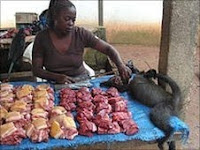
Ape hunters pick up new viruses
Chimpanzees carry viruses which can jump to humans
Two new viruses from the same family as HIV have been discovered in central Africans who hunt nonhuman primates.
Researchers say their work proves it is not unusual for potentially dangerous viruses to jump from primates to man.
They say it is important to monitor disease in bushmeat hunters closely, as any virus they contract from animals may spread to the community at large.
The study, led by the US Johns Hopkins University, is published in Proceedings of the National Academy of Sciences.
Far from being rare events, retroviruses are actively crossing into human populations
Dr Nathan Wolfe
The new viruses identified in the latest study come from a group known as the retroviruses, which are known to cause serious illnesses in humans.
They have been named Human T-lymphotropic Virus types 3 and 4 (HTLV-3 and HTLV-4).
Humans have previously been infected by HTLV-1 and HTLV-2. In most cases, infection does not produce symptoms, but it can trigger neurological problems, and even leukaemia.
Lead researcher Dr Nathan Wolfe said: "The emergence of HIV from primate origins has cost millions of lives.
"The discoveries of HTLV-3 and HTLV-4 show that, far from being rare events, retroviruses are actively crossing into human populations."
Blood samples
The research team collected and examined blood samples from more than 900 people living throughout Cameroon.
All the individuals studied reported some exposure to blood and body fluids of nonhuman primates, contact mostly due to hunting and butchering of bushmeat, and in some cases to keeping primates as pets.
Analysis of the blood samples showed that various simian (ape) viruses had infected the participants.
The two previously unknown viruses were found in two bushmeat hunters.
HTLV-3 is similar to a simian virus called STLV-3, and was most likely contracted through direct contact with a primate during hunting.
HTLV-4 does not have a known primate counterpart, making its origin less clear. The researchers believe it could have arisen through cross-species transmission from an animal carrying an unknown form of STLV.
The same team discovered another primate retrovirus - the simian foamy virus (SFV) - in bushmeat hunters last year.
Threat unclear
At this stage it is unclear whether either of the two newly discovered viruses or SFV are harmful to humans, or can be transferred from person to person.
However, the researchers say their work clearly shows that hunting provides the opportunity for viruses to jump the species barrier.
Dr Wolfe said: "Ongoing collaboration with hunters in central Africa gives us the potential to predict and prevent disease emergence.
"Given the incredible potential costs of a new human retrovirus spreading into the general population, the development of sentinel systems for forecasting disease emergence - such as long-term surveillance of hunters - should be seen as a human health imperative."
Dr Deenan Pillay, an expert in virology at University College London, UK, told the BBC News website that it had been thought few viruses jumped the species barrier.
"This research suggests that there seems to be far more transmission of a whole range of primate viruses into humans than was previously thought," he said.
"But that is not alarming in its own right. If the virus fails to replicate, or to be passed on to others, then it does not pose a threat.
"However, if cross-species transmission is such a frequent event, then all it takes is for one virus to really take hold in somebody, and be passed on to others for it to take off in humans."









